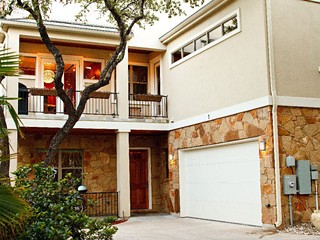STRs: Trying To Draw the Line
City staff recommend the lightest possible regulations for short-term rentals
By Josh Rosenblatt, Fri., June 8, 2012
In an apparent, if unintentional, election-year rebuke to conservative fearmongers, the staff of our liberal city will be recommending the lightest possible regulations for short-term rentals at today's City Council meeting. Rather than supporting the more complicated recommendations approved by the Planning Commission two weeks ago, staffers have subscribed to the almost-libertarian view that a simpler, clearer bureaucratic process will lead to better communication between the city and owners of STR properties and, as a result, decrease general prickliness on the matter.
So much for the era of big government.
Opponents of short-term rentals (which the city defines as any single-family home rented for less than 30 days at a time) look at the recent growth of STRs and see the specter of commercial use creeping its way into residential neighborhoods, pushing out families as it goes. STR supporters, meanwhile, argue that not only do the rentals generate tax revenue and provide housing for attendees of the city's numerous events (say, future Formula One races), but they also give property owners in high-tax, central-city neighborhoods another way to afford their homes.
Late last month, the Planning Commission came up with recommendations to regulate STRs that satisfied neither side. Under the terms of the PC compromise measure, two new land uses would be written into the city's Land Development Code. "Type 1 Short-Term Rentals" would be defined as all owner-occupied registered homesteads, e.g., houses rented out for events such as South by Southwest and the Austin City Limits Music Festival. These could be rented out for no more than 90 total days over the course of a single year. Such owners would be required to register their homes with the city, allow for a health and safety inspection, and notify all neighbors within 100 feet of their property's status as an STR.
"Type 2 STRs" would be the official name for properties currently known as "commercial" rentals – homes that are not owner-occupied and that are rented out for more than 90 days a year. This land-use determination would be a conditional, rather than a permitted, use – meaning owners would have to petition the Planning Commission and go through a public process. And in addition to complying with the Type 1 registration, inspection, and notification requirements, Type 2 owners would not be allowed to operate their commercial rentals within 1,000 feet of another commercial rental or bed & breakfast.
City staff rejected those rather rococo recommendations and decided instead on their own scaled-down version, which boils down to, in essence, registration. Under staff's recommendation, all owners of short-term rentals in residential neighborhoods will be required to register their properties with the city. In addition, any property being rented out more than five times in a single year will be required to undergo a health and safety inspection. That's it.
Staff believes a quality STR registry will enable homeowners to stay more informed of their responsibilities concerning city laws and the payment of state hotel occupancy taxes, while giving the city a better way to communicate with property owners and clear up most of the nagging issues – code compliance, 911 and 311 calls, neighbor complaints, etc. – that have made the STR debate such a nasty one. "We looked at the Planning Commission's recommendations, but we determined that the majority of the issues and concerns raised by short-term rentals in residential communities can be addressed by registering properties and by increasing communication between property owners and the city," says Robert Heil, a senior planner with the city's Planning and Development Review Department. "We think voluntary compliance is the best approach."
STR opponents couldn't agree less, of course. For years, they've been lobbying for stricter regulations on owner-occupied STRs and an end to the commercial STR option entirely; what staff proposes instead is a solution only mildly more regulatory than the regulation-free situation that currently exists. Dowe Gullatt, an attorney representing the interests of 30 or so homeowners loosely affiliated under the name Protect Austin Neighborhoods, says the staff plan would do essentially nothing to stem the tide of STRs in city neighborhoods.
"Registration is a start, but it doesn't accomplish much of anything," Gullatt says. "This is a matter of line-drawing. And we believe the appropriate line to draw is between owner-occupied STRs and commercial STRs." Gullatt's clients support owner-occupied houses being available as STRs for 60 days a year, but hate the whole idea of Type 2 properties. He says recent city auditor data showing that short-terms rentals don't result in more 911 or 311 calls misses the point. "This isn't a nuisance issue; it's a use issue," he says. "This is about the nature of the activity, the commercial use. People who rent these properties are not permanent residents. They have no connection to the city; they don't vote; they don't use our schools; they don't belong to any organizations. Such commercial use strikes at the nature of residential neighborhoods."
On the other side of the argument, groups like the Austin Board of Realtors support the staff recommendations, but believe they still go too far. Emily Chenevert, ABOR's government affairs director, says they'll be at City Hall today with just one request for council: Get rid of the mandatory inspections. "The up-front inspection is a little harsh," she says. "Owners of short-term rentals should be treated the same as owners of long-term rentals: Health and safety inspections should only be required if certain other code violations are turned up by the city after a compliance complaint. It's only right. We're just looking for a balanced approach that treats all homeowners fairly."
Got something to say on the subject? Send a letter to the editor.











